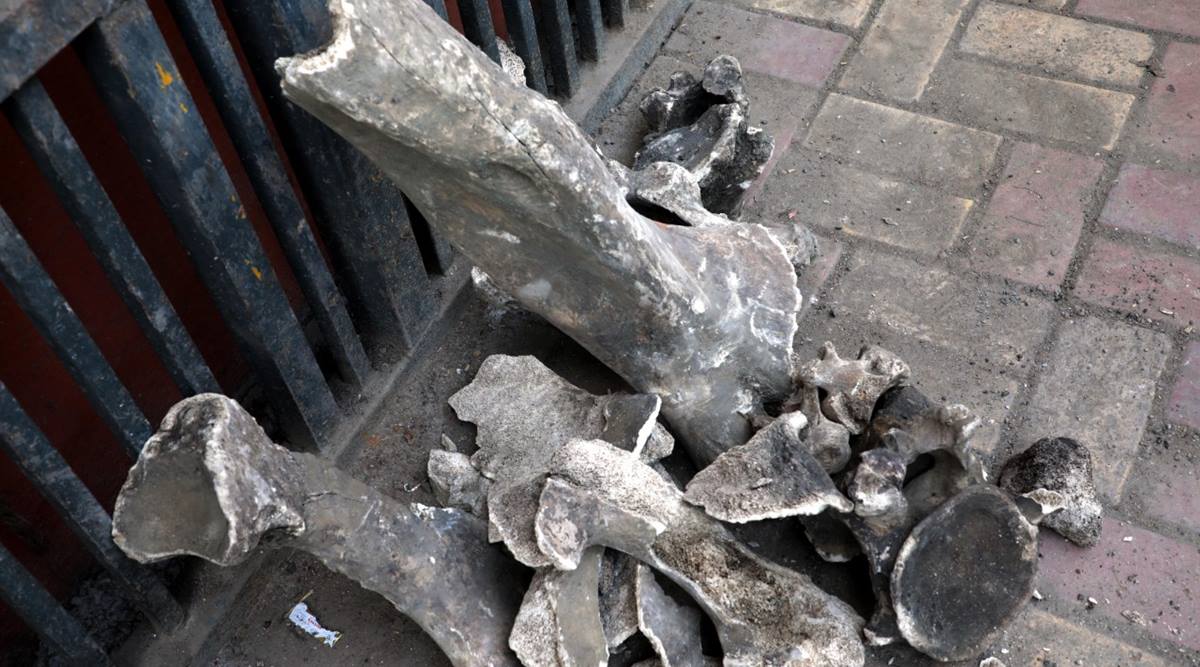
November 26, 2020 11:26:14 pm
 In all, six skeletal elements, two of which belong to the elephant, needed to be scientifically examined, said Pankaj Goel, an archaeologist at Deccan College.
In all, six skeletal elements, two of which belong to the elephant, needed to be scientifically examined, said Pankaj Goel, an archaeologist at Deccan College.
WORKERS digging at the Pune metro site near Mandai have accidentally discovered skeletal remains of animals dating back to when the Peshwas ruled Pune. This is possibly the first time such remains have been found within the city limits. While the remains belong to an elephant and some bovine animals, they were not ancient, but between 200 and 300 years old, experts said.
It was a regular work Wednesday for the workers, who were digging near Mahatma Phule Mandai, when they stumbled on elongated bones. They carefully removed them and alerted experts at the Deccan College Post Graduate Research Institute.
A team of four from the archeology department visited the site Thursday. A preliminary examination has revealed that the bones are from mammals, which could have been buried between 200 and 300 years ago.
“The bones were found at a depth of about 10 feet. A bone was identified as the lower limb of an elephant, ”said Sachin Joshi, an archeochemist at Deccan College, who led the inspection team.
According to experts, as this was an accidental discovery, only one of the bones was intact while the others suffered minor damage and crumbled.
Experts said the bones were not ancient and linked them to the Peshwa era. Local historians trace the presence of a ‘Hatti Mahal’, which literally translates to Palace of the Elephants, located in the vicinity of the current site, suggesting that elephants were commonly found in the locality.
“In those days, the areas around Mandai were not densely populated and therefore could have been used for burials,” Joshi said, adding that the area around the site must be scientifically excavated and the bone samples must be studied. in detail.
Joshi also said that these bones were much lighter and fresher, ruling out fossilization. Experts said the fossilization depended on where the corpses were buried or abandoned, for example inside a cave, underground or elsewhere.
“Fossilization is a slow process. It takes about 1,000 years for corpses to become fossils. Furthermore, the fossils gain significant weight and sometimes become so heavy that they cannot be easily lifted, ”explained Vijay Sathe, a veteran paleontologist, formerly associated with Deccan College.
Between the 1950s and 1980s, multiple archaeological teams from Deccan College carried out multiple excavations in and around the Pune district. In the process, they unearthed similar skeletal remains. Animal bones dating back 50,000 to 60,000 years were also discovered near Morgaon in the Pune district, Joshi said. “But we have no evidence that remains of this type have been found in the city,” he added.
In total, six skeletal elements, two of which belong to the elephant, needed to be scientifically examined, said Pankaj Goel, an archaeologist at Deccan College.
The university now plans to coordinate with the Maharashtra State Archaeological Department, who are the default custodians of the excavated skeletal remains, to study the bones scientifically.
.